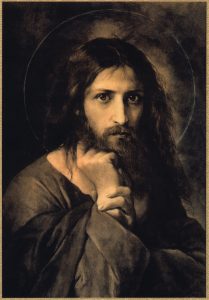“Therefore, just as sin came into the world through one man, and death came through sin, and so death spread to all because all have sinned— sin was indeed in the world before the law, but sin is not reckoned when there is no law. Yet death exercised dominion from Adam to Moses, even over those whose sins were not like the transgression of Adam, who is a type of the one who was to come. But the free gift is not like the trespass. For if the many died through the one man’s trespass, much more surely have the grace of God and the free gift in the grace of the one man, Jesus Christ, abounded for the many.” (Rom. 5:12-15)
Today I wanted to briefly speak upon the words of the Apostle St. Paul in his letter to the Romans, a passage that reveals both the depth of human sin and the boundless grace of God. St. Paul speaks to us of two men—Adam and Christ—each representing two realities, two destinies. In Adam, we see the fall, the entrance of sin, and the consequence of death. In Christ, we see redemption, the outpouring of divine grace, and the promise of eternal life.
Let us consider first what St. Paul says about Adam: “Therefore, just as sin came into the world through one man, and death came through sin, and so death spread to all because all have sinned.” Here, the Apostle does not merely recount history but reveals a fundamental truth about our condition. Adam’s disobedience, his turning away from God, introduced corruption into the world. He chose self-will over obedience, and in that moment, he severed himself from the divine life. Sin entered, and with it, death—the great wound of our nature. This death was not only physical but spiritual. The image of God in man was marred. We inherited not the guilt of Adam’s sin, but its consequences—our nature became subject to corruption, to weakness, to the tyranny of the passions. Death, St. Paul tells us, “exercised dominion from Adam to Moses,” meaning that from the beginning, all humanity suffered under its shadow. Even before the giving of the Law to Israel, mankind was already subject to the wages of sin, for the knowledge of good and evil was within them, yet their hearts inclined toward darkness.
The account does not end there! St. Paul does not speak of Adam’s sin merely to remind us of our fallen condition but to direct us to the One who brings salvation: our Lord and Saviour Jesus Christ. He wrote: “But the free gift is not like the trespass. For if the many died through the one man’s trespass, much more surely have the grace of God and the free gift in the grace of the one man, Jesus Christ, abounded for the many.”
What does this mean? It means that the grace of Christ does not solely undo the fall—it surpasses it! Adam’s sin brought corruption, but Christ’s obedience brings life. Adam’s act severed our communion with God, but Christ, through His incarnation, crucifixion, and resurrection, restores and perfects it. The first man, made from the dust, brought us into exile; the New Man, the God-Man, has brought us back home. This is why St. Paul calls Adam a “type of the one who was to come.” Adam foreshadowed Christ, but where Adam fell, Christ stood firm. Where Adam was conquered by sin, Christ conquered sin itself. This, my dear faithful, is the heart of our salvation. Christ, taking on our nature, unites it once more to God. By His death, He destroys death. By His resurrection, He opens the path to life. In Adam, we were bound to corruption, but in Christ, we are set free. This is not of our own doing. It is not our works, our merit, or our strength that redeems us. It is, as St. Paul says, the “free gift”—the grace of God poured out abundantly through Jesus Christ.
However, though the grace of Christ is given freely, it does not work in us without our cooperation. The question before us is: Will we live as children of the first Adam, ruled by the passions, enslaved to sin, captive to death? Or will we live as members of the New Adam, clothed in Christ, transformed by His grace, partaking of His divine life? We enter into this grace through Holy Baptism, where we are buried with Christ and rise anew. We are nourished by it in the Holy Eucharist, where we partake of His very Body and Blood. We are restored to it through repentance and Confession, where the shackles of sin are broken, and we are cleansed anew. This is the life Christ offers us—a life no longer dominated by sin and death, but filled with the grace of God.
May we, therefore, brethren, cling to Christ with all our hearts. Let us turn away from sin, from all that is of the old Adam, and embrace the new life given to us in Christ. Let us live as heirs of the promise, bearing the fruits of righteousness, striving always toward holiness. And may we never cease to give thanks for this free gift of grace, greater than the trespass, given to us not because we deserve it, but because our God is merciful and loves mankind.
To Him be glory, honour, and worship, with the Father and the Holy Spirit, now and ever and unto the ages of ages. Amen.
May God bless you +
Fr. Charles
2 April 2025

Comments are closed.